 |
| Spanish Steps |
The historical centre of Rome has many public spaces that are not only
beautiful but are historical treasures. Wonder at some of the oldest
buildings in Rome, marvel at some of Rome's best art, and shop in the coolest
neighbourhoods in Rome~all for FREE! You can easily walk the "famous-five" public piazzas linking them together to make an afternoon or evening stroll.
First on my "to see & to be" list is the
Spanish Steps. We have never made it this far North in the center of Rome, and
I was very excited to see this neighbourhood. I love walking in Rome;
around every little corner, there is something new to discover. It's still a
medieval hodgepodge of windy streets, so unorganized and organic, compared to, say, Paris. Passing through the neighbourhoods around the Spanish Steps,
it becomes very affluent, and the shops were becoming more upscale as I
approached the Steps. Eventually, coming to the main shopping drag, all
the Italian lux brands were represented. It was becoming apparent that
we would not be stopping here for lunch, as it's WAY too expensive.
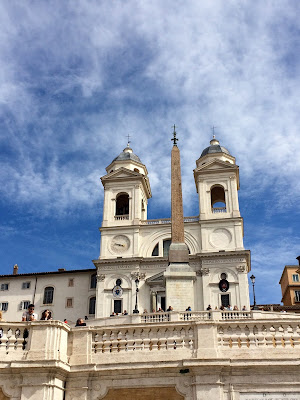 |
| Trinitá dei Monti church |
Then the gorgeous white staircase appeared before me, crowned by the
gorgeous white Church: Trinità dei Monti. We found a spot on the "scala" (steps) and watched all the people
soaking in the sun of Piazza di Spagna. UPDATE: Since August
of 2019, you are no longer allowed to sit on the Spanish Steps. A fine of €400
will be handed out to you if you are caught. Built in 1725, these steps were
the traditional spot for beautiful women to sit, hoping to get noticed by Rome's
artists to become their muse. Apparently, centuries of people's
bottoms gracing this cultural relic mean they are in danger of being damaged.
Next on to the Pantheon. I have been to see the Pantheon several
times, but never when it has been open to check out the inside. This morning, along with my Roman friend Sara, I decided to take a peek inside this ancient
monument. The origin of the Pantheon was a Pagan temple to the Roman Gods
(Pan=many + Theos=God) and there were a lot of Gods! When Christianity
became the only legal religion, the building was re-purposed as a Christian
church, which is how it survived intact to this day. The ceiling is a work
of art and engineering, using a Roman invented material: concrete.
The oculus in the dome is open to the sky to let in the light (and rain) and
reminds us that we are always connected to nature. Victor Emmanuel, the king who unified Italy, is entombed here and the great Renaissance
artist Raphael among others.
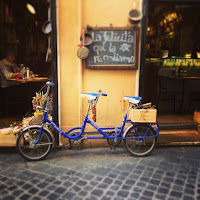 |
| How Rome Rolls |
Tummies are starting to grumble at this point;
so we decide to grab lunch at a local restaurant. TIP: If you can just go off the main drag for a block or two
from any major attraction, you can find restaurants that are only open for
lunch that caters to locals on their lunch break=affordable and home
cooking.
That's exactly what Sara and I did. Great pizzas, salads
and more stuffed "zucchine" flowers (yum) washed down with a
half-litre of the restaurant's house white wine. Bello!
With the tremendous lunch, we had the energy to
move on to Piazza Navona. What a grand public square! Back in
ancient Roman times, this piazza was a stadium and known as "Circus Agonales" where people used to watch the "agones" or games. When the stadium was decommissioned,
the square was used as a local market, which was then moved to Campo de' Fiori.
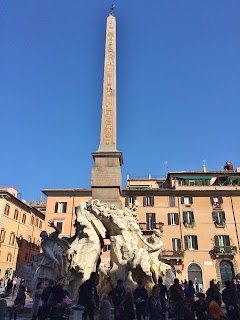 |
| Fountain of Four Rivers |
OK, crush alert: I am totally in love with the Baroque period artist; Bernini. I absolutely love his sculpture even more than Michelangelo. It is his over the top Baroque essence; the emotion his sculptures convey. This man was brilliant. Here in Piazza Navona are the famous Bernini statues: The Fountain of the Four Rivers surrounding the Egyptian Obelisk brought to Rome by Emperor Caracalla. Fontana del Moro balances with Fontana of Neptune on either end of the piazza, created by artist della Porta. Bernini is the Baroque sculpture MASTER, and this piazza does not disappoint. Pope Urban VIII said to Bernini: "YOU are made for Rome, and Rome for you." I believe that without a doubt.
If you want to see a movie about Rome and Bernini, watch Angels and Demons adapted from Dan Brown's book-it's pure travel porn.
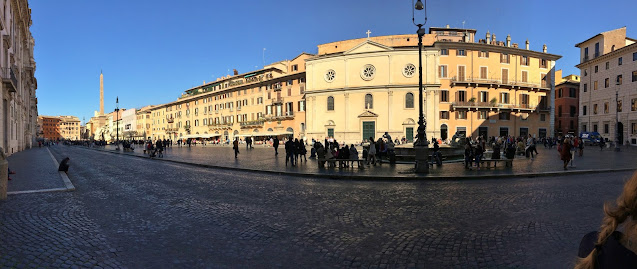 |
Piazza Navona
|

While Bernini may have been made for Rome, I was
made for gelato. To eat it, that is. Yes, It was time for my daily
gelato, and Frigidarium between Piazza Navona and the
Pantheon is a great place to stop in! The lemon gelato here was
delicious! TIP: the best gelato is not the
mountains of super bright coloured stuff that's filled with artificial
flavour and colour!
Look for subtitle colours of gelato, a soft, spreadable consistency, packed tightly into a metal tin with a lid, and is
scooped out by flat paddles. You can always tell a good gelato
place by looking at the lemon gelato-it should be white instead of
yellow. And really, there is no such thing as "bad" gelato, in
my opinion. So don't worry about it too much. The only way to be a true
connoisseur of gelato is to eat your own weight of it while you are in Italy.

Campo de'
Fiori is Rome's colourful outdoor market. Everything from fruits and
vegetables to souvenirs is sold here, while butchers, bakers and cheesemakers
shops surround the market stalls. There are many historic buildings in
the area that date back to the Rennaisance period of Rome. Campo de'
Fiori is my favourite area in Rome because of the bohemian vibe and its
people-watching potential. For more about Campo de' Fiori, check out my
blog post: Rome's Outdoor Market.
 |
| Enoteca |
Aperitivo hour
in Rome is 5:30-7:00pm (ish), grabbing a table in a piazza or heading out to an
enoteca. An enoteca is a wine bar where you can order wine by the glass,
from opened bottles of wine; sometimes, they are special vintages. If you
like the glass of wine, you can buy the bottles to take home. My favourite
enoteca in Campo de' Fiori is called Il Goccetto. HEAVEN. Along
with wine, they have marvellous cheeses and sausages to share around the
table. You can bring your teenager there, no problem. The
best part of this experience: we were the ONLY tourists there!
TIP: dinner hour in Italy starts at
about 8:00 and continues to 10:00 or 11:00 at night. That's why it's
handy to have a larger lunch or a small snack at 5:00, so you can make it to the
late dinner time. I conveniently grabbed
some bottles of wine to go from the enoteca, to have on hand for the remainder
of my time in Rome.
Rome at night has a different pace and atmosphere than during the daytime. Check out my blog post: A Night Stroll Through Rome to all the same piazzas, including the famous Trevi Fountain. The evening stroll in Italy before and after dinner is customary and called the passeggiata. There are far fewer tourist crowds at night, so you will be able to get close enough to the fountain to actually toss the customary coin in the waters. Be careful, don't try to wade in the fountain like in La Dolce Vida, or you will get slapped with that same €400 fine for sitting on the Spanish Steps!
What are your favourite piazzas in Rome? Perhaps they are a bit off the beaten path? I would love to hear about them in the comments section below!
Follow me on FACEBOOK, INSTAGRAM and BLOGLOVIN' for daily photos and updates! #slowtravel🐌











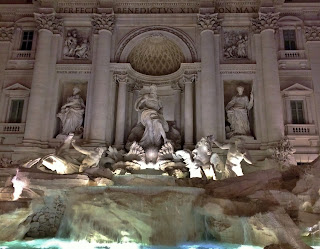

No comments:
Post a Comment